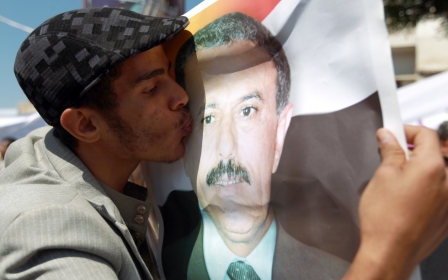AQAP says Houthi militia are 'faithful US partners'

Al-Qaeda said Thursday that four of its members had died in an American drone strike in Yemen, accusing the Shiite Houthi militia of becoming 'faithful US partners'.
The four militants were killed in a January 31 "crusader American drone strike against their car" in the southern Shabwa province, Al-Qaeda in the Arabian Peninsula said on Twitter.
AQAP named one of its senior figures, Harith al-Nadhari, among the dead as well as Said Bafaraj, Abdelsamie al-Haddaa and Azzam al-Hadrami.
Tribal sources had said at the time that four suspected militants were left charred in their car after a drone strike.
Nadhari had urged more attacks on France like those on satirical magazine Charlie Hebdo and a Jewish supermarket in Paris that killed 17 people.
"It is better for you to stop your aggression against the Muslims, so perhaps you will live safely," Nadhari was quoted saying in a January 10 video after the attacks.
Four days later, AQAP ideologue Nasser bin Ali al-Ansi claimed the Charlie Hebdo assault on behalf of the group.
Despite an ongoing political crisis in Yemen, US President Barack Obama vowed on January 25 not to let-up in Washington's campaign against militants there.
He ruled out deploying troops, but said Washington would continue "to go after high value targets inside Yemen".
At least 11 suspect Al-Qaeda militants have been killed in drone strikes in central and southern Yemen since then.
Western governments say it is unclear if AQAP directly orchestrated the Charlie Hebdo attack, although they do believe one or both of the perpetrators, brothers Said and Cherif Kouachi, spent time with militants in Yemen.
AQAP was formed in 2009 after a merger between militants in Yemen and Saudi Arabia.
'Houthis have become faithful US partners'
According to the New America Foundation, the United States has carried out more than 110 strikes in Yemen since 2009, mostly using drones.
In September 2011, a drone strike killed US-Yemeni cleric Anwar al-Awlaqi.
That latest attack followed "statements by US officials on further intelligence cooperation with the Houthis on fighting terrorism," AQAP said Thursday, referring to the powerful Shiite militia that seized Yemen's capital in September and has clashed with Sunnis since then.
"Houthis have become faithful US partners in preserving its interests and implementing its plans in the Arabian Peninsula," said AQAP, vowing to continue fighting "Americans, crusaders and Houthis."
The Houthis seized the presidential palace and key government buildings on January 20, plunging the country deeper into crisis and prompting President Abedrabbo Mansour Hadi and his premier to resign.
Since they overran the capital and towns further south, they have met resistance not only from Al-Qaeda but also Sunni tribesmen.
The Pentagon has said US officials were holding discussions with representatives of the militia but were not sharing intelligence.
"Given the political uncertainty, it's fair to say that US government officials are in communication with various parties in Yemen about what is a very fluid and complex political situation," said Pentagon spokesman Rear Admiral John Kirby.
US 'military objective' is hitting AQAP, not Houthis
Meanwhile, Secretary of State John Kerry Monday praised Qatar for its help in trying to resolve the crisis in Yemen.
Meeting with Qatari Foreign Minister Khalid al-Attiyah at the State Department on Monday, Kerry said he was grateful for the "many ways in which Qatar, the emir, and Dr. Attiyah have made themselves available in order to be of assistance."
"Most recently, they were particularly helpful with respect to Yemen and our efforts in the last few days to deal with some of the adjustments necessary to what has been happening there."
Asked later at a forum at the Atlantic magazine what Kerry meant, Attiyah did not go into details.
"We've been closely talking to our friends about the GCC initiative and how we can enhance the solution," the minister said.
In 2011, the monarchies of the Gulf Cooperation Council (GCC) urged the then president to sign a power transfer plan ending the country's political turmoil.
But the new crisis has raised fears that impoverished Yemen, which lies next to oil-rich Saudi Arabia, could become a failed state.
The Wall Street Journal last week reported that US officials were in touch with Houthi fighters largely through intermediaries.
"We have to take pains not to end up inflaming the situation by inadvertently firing on Houthi fighters," a senior US official told the Journal.
"They’re not our military objective. It’s AQAP and we have to stay focused on that."
Stay informed with MEE's newsletters
Sign up to get the latest alerts, insights and analysis, starting with Turkey Unpacked
Middle East Eye delivers independent and unrivalled coverage and analysis of the Middle East, North Africa and beyond. To learn more about republishing this content and the associated fees, please fill out this form. More about MEE can be found here.




